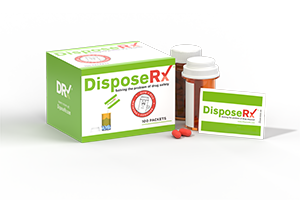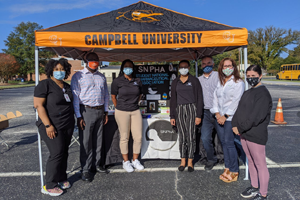Carol Dorn Sanders, MA, FACHE, Senior Vice President of Marketing and Communications for DisposeRx, Inc., recently conducted an interview with Dr. John Edwards and Dr. Stace Dollar-pain management specialists at Baptist Health in Lexington, Kentucky. Both certified registered nurse anesthetists were co-authors of research reviews on the topic of medication disposal that were recently published in peer-reviewed journals.

To view the interview, please click on the image above or click here.
read more about the research projects
Stace Dollar, DNAP, CRNA, co-author
Review
Opioid Disposal Education Research Stace Dollar DNAP 05122022
Journal of PeriAnesthesia Nursing
Conclusion: Patient education about opioid misuse, diversion, and disposal are essential topics that need to be addressed with patients and caregivers. Healthcare professionals should initially provide and actively discuss the opioid educational material with the patient in the office when surgery is scheduled, and the opioid prescription is written. Patient education should be a combination of print, audio-visual, demonstration, verbal, or web-based. While verbal education should be part of an integrated, multimodal patient education session, the education must be delivered in a fashion that augments the patient’s learning, comprehension, and retention level.21 It is imperative that strategies to address the profound and growing problem of opioid abuse and addiction in the U.S. be devised, tested, validated, and implemented.22 Proper opioid disposal is essential to prevent opioid misuse and diversion. The goal to increase opioid disposal requires a patient’s awareness of the dangers of leftover opioids, providing the patients with an easy method to dispose of and reminders to dispose of via digital technology formats.
John M. Edwards, III, DNAP, CRNA, co-author
Surgical Patient Compliance With Opioid Disposal Products_Journal of Nursing Administration 122021
The Journal of Nursing Administration
Conclusion: Findings suggest that healthcare facilities could diminish misuse of opioids by providing in-home opioid disposal products to patients undergoing surgery. Combining education and an in-home opioid disposal product perioperatively increases the likelihood of patients disposing their unused drugs and potentially reduces opioids in the community. Nurse leaders have an opportunity to collaborate with hospital-based caregivers in an effort to address the opioid problem in the United States. Evidence suggests that providing opioid disposal products and educating patients regarding their use can diminish leftover opioids. Although the best timing for education, as well as the type of information provided, remains unclear, findings from this review clearly support the use of a disposal product.



